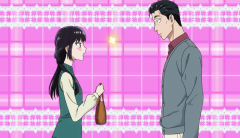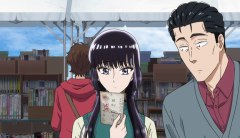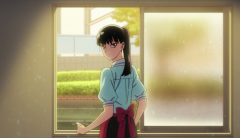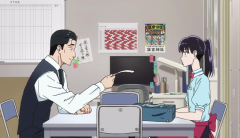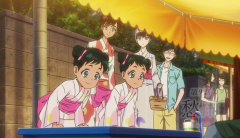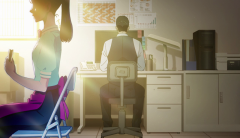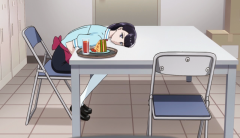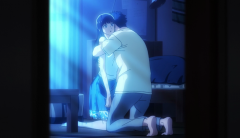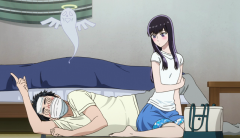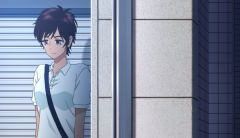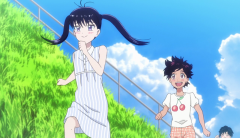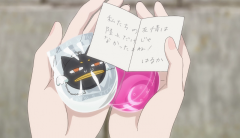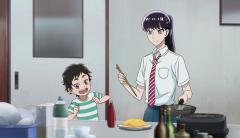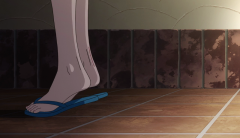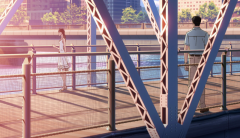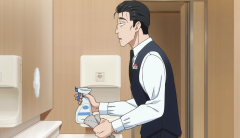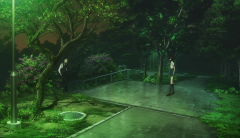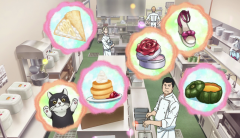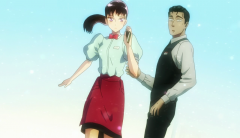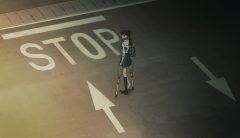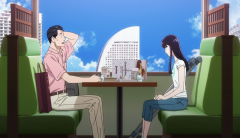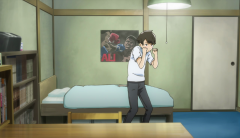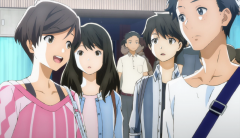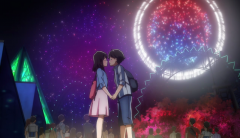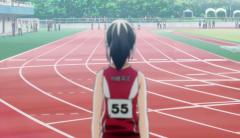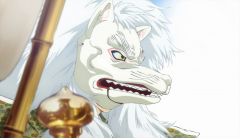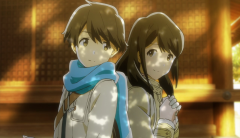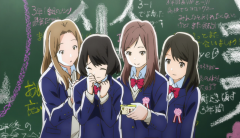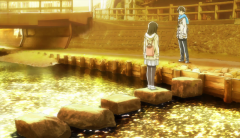At this point I can safely say that I will enjoy whatever direction Ameagari will wrap up. It has transformed from a merely love story between two adorable individuals with a huge age gap into something much deeper, more refine and more poetic. This episode is another stellar showcase in a way it feels entirely real, the compliment I can’t say in most of anime out there. Many moments from the show reminds me of real life through the way people interacting with each other and in many subtle glances and gestures. Maybe I’m at the same wavelengths with these characters, or maybe I’m just the same sad sack who let the things I love slowly slipped away, but I can relate all to well with both Tachibana and Kondou’s current situation. Kondou mentioned in the past that he regarded himself as “a 45-year-old boy with no hope or dream”, but in truth it’s not that he doesn’t have any dream, it’s that he had a long-lost dream. He devoted himself to literature and write novels until he got marriage, and the pressure of both pursuing his dream and maintaining his role in the family ended up at him losing both, and like the cicada shell he saw in the park, Kondou loses the nature that makes him “Kondou”.
The same can be said for Tachibana and her track career. The doctors mention that with a proper rehab, she could get back on track, but she decides not to. We know that running used to be her passion, we know that she still cares about running through her frustration when seeing other teammates practice, or through her buying a “Running” photobook. In an essence both Kondou and Tachibana try to look away from the passions, one keeps hanging on with life, the other pursues another (unhealthy) path. As the story progresses, the love story has evolved from “girl gets boy” into them support each other finding what they really love, and in turns, who they really are.
And I still haven’t mentioned some wonderful moments between them. First with the book fair where Kondou meets his old bookseller, wanders around mindlessly by himself and exchanges the shortest texts ever with Tachibana. I do find them repeating the same symbols kind of obvious, but well, the message is still rewarding. You can also see the more Kondou loses himself to his own thoughts, the more impressed Tachibana has for Kondou. She comes to the point of knowing him AND still love everything about him. Their exchanges towards the book she read, the swallow and then her speech in the end play out near flawlessly. Let’s delve a bit into Kondou’s own thought on the last swallow who has trouble flying. The manager comments that even if the bird can’t fly, he’d find happiness in the place he stays, but still looks up to the sky sometimes. It’s no doubt that there is a parallel between the bird and Kondou’s own feeling about his life. He accepts the life he’s living now, although he knows he’s leading a boring life with lost dream and no future, and maybe it’s Tachibana who can crack this and makes him write again.
This episode also addresses the on-going fallout of Tachibana and Haruka, as the two of them clearly still care for each other, as they check out each other’s posts but feel awkward to even make a move. Last episode, I took it as they need some time off (10 years!) like Kondou and Chihiro before they can feel comfortable to talk to each other again, but the way I see it now, they will get back sooner; and I hope Ameagari gives us a satisfying ending for both this plot thread, Tachibana’s running, Kondou’s writing and most of all, Kondou and Tachibana’s relationship. They might not be together in romantic sense at the end of the day, but they come to understand each other more and giving each other a necessary push to embrace life again. And for me that relationship is hundred time more precious than they’re romantically interested in each other.
PS: just the other night I listened to Ameagari’s scores on Youtube (what little of them anyways), and the soundtrack is mesmerizing. I could totally picture Tachibana in the rain, or moment when Kondou sees himself in his teen self. It’s not often a piece of music can carry you to such a specific place and time and mood so I treasure every second of it. Certainly one of the finest soundtrack in recent years. And to think that it’s just one part that makes Ameagari so excellent: the story, the direction and the visual (for those of you who aren’t aware, Wit Studio has their own “make-up animation” team, which is a team who apply special effects to certain scenes, as you can see in one of the screenshot) are all special in its own ways. This show is truly exceptional.

